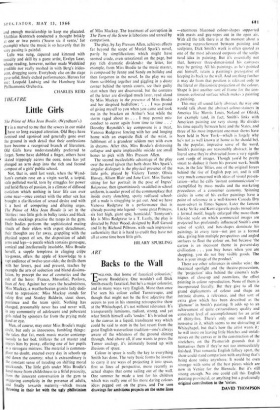OPERA
Musical Embosoming
LIKE all the good things of life, Hamburg State Opera's week at Sadler's Wells went by quickly : so quickly that on Saturday night I wanted to grab their coat-tails and not let them go. They gave us three pieces—Cosi fan tutte, top dog in any company even when the production's a shade below top drawer, Alban Berg's Lulu (with an orchestra that saturated my ears and got into me like a drug) and that fairy-tale-cum- homily, Die Frau ohne Schatten: words (such a lot of them) by Hofmannsthal, music by Richard Strauss. Since both performances were crammed and we shall be hearing the first produc- tion of it at Covent Garden about a year from now, Die Frau, although musically negligible alongside Mozart and often coarse in facture as compared with Berg, is very much in the air, so to say, and must have precedence here.
Whether through adaptation to SW's small stage or because the Hamburg producer and de- signer (Herren Schuh and Otto) weren't bothered anyhow, the visual marvels promised by the text either didn't happen or didn't impress. Perhaps Covent Garden will make more plausible jobs of women walking shadowless in bright light; Adonis-types and pearl hair- bands and a sword and a pretty kettle of fish whistled up from thin air; a marital bed which symbolically splits of its own accord into two single ones; and so on. What then? Shall we be a great deal better off? Stage tricks and illu- sions are not in themselves dramatic incident;
they do not in themselves illustrate the bite of character upon character. In the main, Hof- mannsthal conveys human conflict and supernal intervention through set pieces and situations that tend to congeal. As usual in such cases, it is left to the composer, if he has it in him, to charge the words with emotional current and, in effect, explain what the words are about.
Strauss achieves precisely this perhaps two- thirds of the time. In the case of the central character, Barak the Dyer, he does it to heart- , warming and (yes!) elevating effect. The Barak of the libretto, ideal father in posse, is denied children through his wife's termagant disposition. Frustrated to the core, he nevertheless remains patient and big-hearted. He works like a cart- horse, always for others. He is splendid in a copybook way and makes me yawn rather. But then 1 listen to Barak's music.
There are several Barak themes. The theme that knocks me over is the one which analysts have labelled Barak's Goodness. You hear it come sailing and soaring out, among other places at the end of the party which Barak throws for the beggar children in Act 2. It isn't so much the note-sequence that opens Barak's heart to us as the underpinning seventh-harmonies and other modulatory turns. Here is music of the sort that takes the whole world to its bosom. No matter how cynical musical idioms may affect to become (they can't become so really), there will always be a market for musical em- bosomings of this kind. The trouble with Strauss is that his embosomings don't always work. I know for sure that I'm not the only one who listened with distaste to the A flat major platitudes for offstage Watchmen at the end of the first act. At the interval I met a conductor of high talent and multiple tastes, a man not given to knocking for knocking's sake. He likened the Wachter music to Moody and Sankey pieties. I sorrowfully concurred.
We mustn't forget what the Wachter sing about, however. The begetting of the unborn is the burden of their song and of many another set piece, choral or otherwise, in Die Frau ohne Schatten. Hofmannsthal's philoprogenitive paean has a faith and a warm, generous mysti- cism that aren't to be slapped down or laughed out of court by today's overpopulation and famine graphs. It is a poignant if macabre thought that Strauss was putting these 'hallowed fecundity' sentiments to music during years (those of Verdun, the Somme, Passchendaele) when birth had become a prelude to cannon- fodder. Not only, then, did the two Hamburg performances give us rich, discreetly balanced sound from an orchestra of ninety-two players (in the SW pit!) and strong or fine singing (or both at once) by Franz Crass (Dyer), Gladys Kuchta and Isabel Strauss (Dyer's Wife), Irene Dalis (the splendidly acted Nurse), Enriqueta Tarres and Ernst Kozub (Emperor and Empress). They also sent us home arguing theses which, though by no means incompatible with music, go far, far beyond it.
A glance at the two companion pieces. Like many others I jibbed at certain of Gunther Rennert's production slants in Cosi but am wholly with him in the seaside fishing-rod he gave Dora- bella to ply in one of her scenes with Fiordiligi. In Da Ponte's 'book,' human smarts and follies are stated with a combined levity and cynicism that warrant, even plead for, frivolous detail here and there. That's one consideration. Another is the smooth virtuosity with which Kerstin Meyer pursued her duet line while landing a catch and rebaiting. The cast as a whole sang with verve
and enough musicianship to keep me placated. Matthias Kuntzsch conducted a thought briskly at one or two points (`Soave sia it vento,' for example) where the music is so heavenly that its very passing is painful.
Lulu was sung, capered and kittened with tenacity and skill by a guest artist, Evelyn Lear, whose reading, however, neither made Wedekind credible nor really meshed in with Berg's irides- cent, drugging score. Everybody else on the stage gave solid, finely etched performances. Heroes for me: Leopold Ludwig and the Hamburg State Philharmonic Orchestra.
CHARLES REID



































 Previous page
Previous page